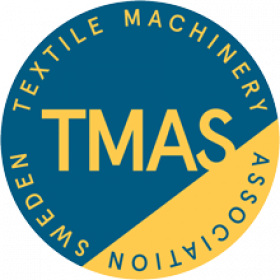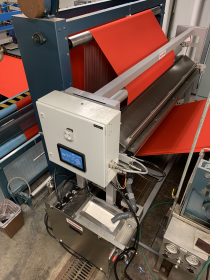TMAS Members at ITMA Asia + CITME 2023
Members of TMAS – the Swedish Textile Machinery Association – will be taking part in the forthcoming ITMA Asia + CITME exhibition, taking place from November 19-23 2023 at the National Exhibition and Convention Centre in Shanghai, China.
Weaving
In the area of weaving, 93% of the 114,000 new looms delivered in 2022 went to Asia, according to the latest figures from the International Textile Manufacturers Federation (ITMF), with China the top destination, followed by India.
As a result, TMAS members like Vandewiele Sweden AB and Eltex have a huge market to address that has been established over many decades.
Vandewiele Sweden AB benefits from all of the synergies and accumulated know-how of the market-leading Vandewiele Group, supplying weft yarn feeding and tension control units for weaving looms to the majority of weaving machine manufacturers. It also retrofits its latest technologies to working mills to enable instant benefits in terms of productivity and control.
Yarn and sewing thread monitoring
With nearly 70 years of expertise in yarn sensor technology, Eltex of Sweden AB has been at the forefront of new product development. Its EYE and EyETM systems are capable of accurately and efficiently monitoring the movement and tension of more than 1,000 yarns simultaneously. These systems are suitable for various applications and fibre types, including warping, winding, multiaxial weaving and new material applications.
Eltex sewing tension monitors, such as the ETM422, have been well-received by customers. This device can monitor the tension of sewing threads in real time, effectively improving the quality and safety of sewn products. Particularly in China's rapidly growing automotive manufacturing sector, the ETM422 has seen widespread use to meet the industry’s escalating demands for product safety and quality.
Dyeing and finishing
“Digitalisation, automation and AI have become the key enablers for sustainable gains across the entire textile industry and so much has been achieved in the past few years, especially in terms of automation,” says TMAS secretary general Therese Premler-Andersson. “One area in which TMAS members are really making a difference right now, is in replacing water and energy-intensive technologies for the dyeing and finishing processes with new digital technologies.”
The TexCoat G4 non-contact spray technology for textile finishing and remoistening, for example, will be showcased in Shanghai by Baldwin. It not only reduces water, chemicals and energy consumption, but also provides the flexibility to adapt to a customer’s requirements in terms of single and double-sided finishing applications. The TexCoat G4 can reduce water consumption by as much as 50% compared to traditional padding application processes.
TMAS














